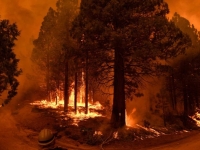News
The fire devours Spain
Two people have died
USPA NEWS -
Spain is burning. The forest fires that, for three weeks, have burned the mountains of ten of the seventeen Spanish regions have burned 30,000 hectares in the last five days. The extreme heat that affects the entire country, with maximums of up to 45 degrees Celsius (113ºF) in the Northern regions, and the consequent drought increase the risk of fire throughout the territory. But they are not the only causes of the wave of fires that Spain is suffering.
In just five days, the fire has burned 30,000 hectares throughout Spain and has caused the death of two people - a firefighter and a rancher - and serious injuries to two others, a farmer and a driver who worked on the extinction of one of the fires. Hundreds of thousands of people have been evicted from their homes, given the risk that the fire will approach inhabited areas. The neighbors organize themselves into brigades that dig firebreaks to prevent the advance of the flames, but sometimes their work is useless. In areas such as Galicia and the neighboring province of Zamora, the fire was declared inextinguishable on Monday. The strong wind blowing in the area and the steep terrain make it difficult for firefighters to attack the head of the fire. In Extremadura, a border region with Portugal, the fire attacks the national parks of Las Hurdes and Valle del Jerte.
Drought, heat and strong wind are at the base of this wave of fires that affects most of the Spanish territory. "Climate change kills," said Prime Minister Pedro Sánchez on Monday, who visited the burned areas in Extremadura. But it's not just climate change. The Spanish countryside has suffered for decades the effects of depopulation and the abandonment of the fields. The low prices of agricultural products, compared to the high cost of fuel and electricity, together with the lack of prospects for young people, explain the abandonment of rural areas. There are no people left, but no pets either. Sheep and goats, which clean the mountains, have left many areas that were previously inhabitated. And its absence causes an accumulation of vegetable fuels, from which the fire is nourished.
Spanish environmental organizations warn that the effects of the fight against climate change will be seen in the long term and do not depend on a single country, but the fight against the depopulation of the countryside is in the hands of politicians. Also the provision of personnel and materials that allow attacking the fire in its first moments, without waiting for it to get out of control. But there is not much will among politicians - beyond flashy statements - to act against low prices at origin, to improve services in rural areas and to expand the educational offer for young people in these areas.
And meanwhile, the fire does not let up. The forestry brigades, reinforced by the Military Emergency Unit (UME in its acronym in Spanish) and the Civil Guard, have been working tirelessly for three weeks. They are not optimistic: as long as the drought persists and temperatures remain so high, we will have to be vigilant. The Valle del Jerte fire in Extremadura was caused, but many others are the result of lightning strikes. And storms are frequent in Summer.
Liability for this article lies with the author, who also holds the copyright. Editorial content from USPA may be quoted on other websites as long as the quote comprises no more than 5% of the entire text, is marked as such and the source is named (via hyperlink).






